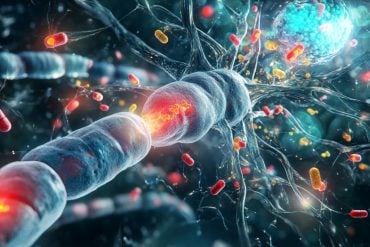Summary: A new artificial intelligence algorithm analyzes personal risk factors to accurately predict stroke recurrence in patients.
Source: Emotive
Artificial intelligence (AI) can be used to give stroke patients a personalised and more accurate risk for suffering a recurrence, according to a new study presented today at the European Stroke Organisation (ESO) Conference.
Experts believe the study will help to identify the most important factors for preventing stroke recurrence and has the potential to help prevent many thousands of strokes a year in Europe, and in doing so prevent many deaths and cases of disability.
According to previous research, one in four stroke survivors will have another stroke and yet up to 80 per cent might be prevented with the right treatments and lifestyle changes. The number of people living with stroke is estimated to rise by 27% between 2017 and 2047 in the European Union, mainly due to an increase in the number of people over 70.
The study used calculations based on both non-modifiable risk factors, such as age and ethnicity, and modifiable lifestyle risk factors and habits such as smoking, weight, blood pressure and cholesterol, diet, obesity, physical activity levels and treatment compliance, as well as socio-economic factors. These can be used to make a more accurate prediction of an individual’s risk of having a stroke recurrence, within 3 months, one year, and more than a year, helping to prevent a recurrence and improve patient’s treatment adherence.
The research, conducted by scientists from Vall d’ Hebrón University, Barcelona, Spain, used a dataset of 41,325 patients admitted with a stroke diagnosis in 88 public hospitals over six years, and fed them into an AI-based model which was able to provide an individualised risk of stroke recurrence at three and 12 months.
Lead author Giorgio Colangelo, AI Research Manager at Vall d’ Hebrón University Hospital’s Institute of Research (VHIR), Barcelona, Spain, commented, “We were able to use AI to predict the stroke recurrence at 3 and 12 months on an individual level, and knowing this risk has clinical value for doctors and for patients. Risk factors included high blood pressure and raised cholesterol, atrial fibrillation or sleep apnoea. We also determined and quantified what are the most relevant risk factors and which of them each patient can modify in his or her lifestyle.”

Dr. Marta Rubiera, Neurologist at Vall d’ Hebrón University Hospital and coordinator of the study, added, “We hope the data may be used to create a much more personalised prediction of if, and when, patients might have another stroke, and that by explaining the impact of individual risk factors, it will make patients more likely to comply with any treatment prescribed or lifestyle changes suggested, reducing the likelihood of having another stroke”.
Dr. Marc Ribo, Interventional Neurologist, and Chief Scientific Officer at Nora Health, which also participated in the study, concluded “Patient awareness and empowering self-care are crucial to reduce the risks of recurrent stroke. This study will help inform the personalisation of a recently developed app, NORA and greatly improve patients’ risk management.”
About this study:
Giorgio Colangelo, PHD, is AI Research Manager at Vall d’ Hebrón University Hospital’s Institute of Research (VHIR), Barcelona, Spain.
Dr. Marta Rubiera is a Neurologist at Vall d’ Hebrón University Hospital, Barcelona, Spain.
Dr. Marc Ribo is a Interventional Neurologist and Chief Scientific Officer at Nora Health.
About this AI and stroke research news
Author: Sean Deans
Source: Emotive
Contact: Sean Deans – Emotive
Image: The image is in the public domain
Original Research: The findings will be presented at the European Stroke Organisation Conference






